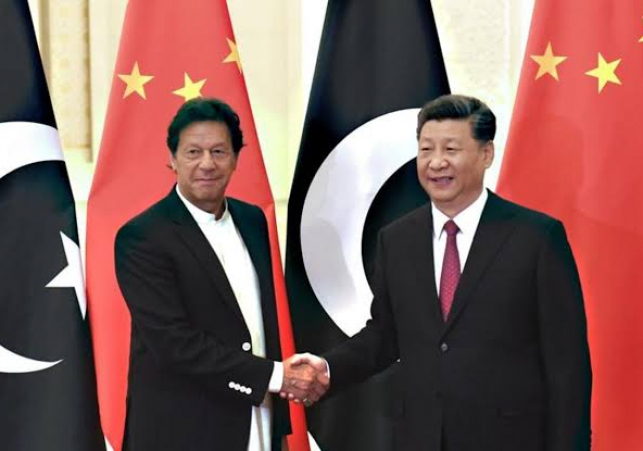

Imran Khan, who was an outspoken opponent of the China-Pakistan Economic Corridor before ascending to office, now claims that the project is strategic for both countries and provides substantial benefits.
Pakistan and China signed a new agreement on Friday to start the second phase of the USD 60 billion China-Pakistan Economic Corridor (CPEC), with Prime Minister Imran Khan praising the controversial projects, saying they are strategic for both countries and will provide tangible benefits to the people.
On Friday, Khan held a virtual meeting with He Lifeng, Chairman of China’s apex planning body, the National Development and Reform Commission (NDRC), to discuss the expansion of Chinese investments in Pakistan. Khan arrived in China on Thursday for a four-day visit to attend the opening ceremony of the 2020 Beijing Winter Olympics and meet with top Chinese leadership.
According to Pakistan’s state-run Associated Press of Pakistan news agency, State Minister and Chairman of the Board of Investment Muhammad Azfar Ahsan and He signed the Framework Agreement on Industrial Cooperation, which aims to attract Foreign Direct Investment (FDI), promote industrialization and development of economic zones, and initiate, plan, execute, and monitor projects in both the public and private sectors.
Khan, who was a critic of the China Pakistan Economic Corridor (CPEC) before coming to power because of its secrecy and uneven investments that ignored certain areas of the country, said the project is essential for both countries and provides real benefits.
According to the report, he stated that the CPEC’s early-harvest projects had reshaped Pakistan’s economic landscape, creating a solid foundation for long-term economic growth.
Both sides evaluated the status of ongoing CPEC projects and discussed preparations for future initiatives during the meeting, according to the statement.
In response to Chinese criticism of project delays, Khan, who had previously ordered the repeal of 37 restrictions impeding the CPEC projects’ progress, restated the two countries’ commitment to completing them on time.
The ambitious CPEC is a 3,000-kilometer infrastructure project that connects China’s northwest Xinjiang Uygur Autonomous Region with the Gwadar Port in Pakistan’s western Balochistan province.
India has lodged a protest with China against the CPEC, which is being built through Pakistan-controlled Kashmir (PoK).
Foreign Minister Shah Mahmood Qureshi, Finance Minister Shaukat Tarin, Planning Minister Asad Umar, Information Minister Fawad Chaudhry, National Security Advisor Moeed Yousaf, Commerce Advisor Abdul Razak Dawood, and Special Assistant on CPEC Khalid Mansoor are among Khan’s high-level delegation in China.
He is scheduled to meet with President Xi Jinping and Premier Li Keqiang of China.
The need for a comprehensive Framework Agreement became critical when CPEC reached its second phase, which focuses on the development and industrialization of Special Economic Zones (SEZs), according to the research.
According to a report published last year by the US-based international development research lab AidData, a significant portion of Chinese development financing under the CPEC consists of loans at or near commercial rates rather than grants.
According to the report, Pakistan received roughly half of all Chinese development finance in the form of “export buyer’s credit,” or money granted to Pakistan by Chinese institutions to support the purchase of equipment and goods by Chinese implementation partners.
According to the research, up to 40% of China’s lending to Pakistan does not appear on the government’s records “for the most part.”
Dawn wrote in an editorial about the AidData study that the nature of Chinese finance for infrastructure programmes under the CPEC initiative necessitates greater openness in the projects that have been carried out here since 2015.
When Khan was in opposition, the PTI (the ruling Pakistan Tehreek-e-Insaf party) requested complete openness in CPEC investments.
“However, now that it is in office, it has done nothing to make public the costs or terms of the CPEC arrangements with China’s government, enterprises, and banks, keeping the topic completely under wraps, just as its predecessor had done,” the editorial added.
“That the majority of Chinese finance for CPEC plans consists of pricey commercial loans isn’t the only concerning feature,” it continued. What’s more alarming is that up to 40% of Chinese loans have been disbursed in a way that blurs the line between private and state debt, effectively eliminating the need for it.
Furthermore, in the form of sovereign guarantees or guaranteed returns on equity, Islamabad has provided Chinese investors with “explicit or implicit government liability protection.”
Then, about half of all Chinese finance has come in the form of ‘export buyer’s credit,’ or money lent by Chinese institutions to Pakistan to facilitate the purchase of equipment and goods to be purchased by Chinese implementation partners, the editorial continued, “along with awarding contracts to Chinese without competitive international bidding.”
Also read : Pakistan's security strategy aims for a century of peace with India.